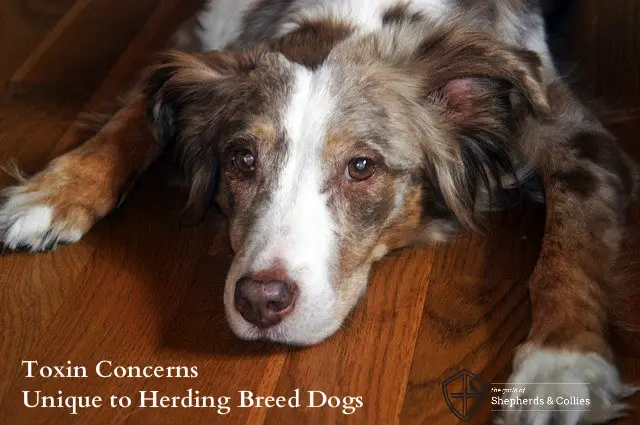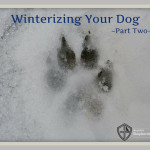2 Toxin Concerns for Herding Breed Dogs

The Toxin Concerns Unique to Herding Breeds that You Need to Know About
Exposure to various poisons and toxins is of concern to all dog fanciers. The top threats include both human and pet medications - usually accidental poisonings due to an overdose. Both of those threats are a major concern for owners of herding breeds, since our dogs are fast and inquisitive enough to find and snag any dropped pills, and often expert-level in opening medication bottles – especially if the medications are flavored. However, there are two classes of toxin exposure, which lead to poisonings, that are somewhat unique to herding breed dogs.
Toxin Exposure Through Medications
The first class of toxin exposure is through dewormers, such as ivermectin. Dogs hanging out at barns may get an overdose of ivermectin in a couple of ways. Any dropped dewormer, such as apple flavored paste for horses, is attractive to dogs as well as equines. Your dog may lick up any dewormer spit out by a horse and left on the barn floor.
In addition, many dogs find manure quite attractive. Usually inhaling a horse “apple” or snarfing down some sheep droppings is gross, but not highly risky to your dog’s health. Though, that scenario changes if the livestock has recently been dewormed with an ivermectin product. Some of the dewormer will pass through, ending up in the manure - and any dog can be poisoned if he ingests a large enough amount of the ivermectin laced manure. For dogs with the MDR 1 gene mutation, ingesting even a small amount of ivermectin can lead to serious illness or death.
The reality is that herding dogs may be exposed to this medication any time they are doing chores or have gone to a trial or herding lesson. Stock owners who are aware of this potential problem will deworm their animals and put them in a field where they are not worked by any dogs, and they carefully dispose of the manure post deworming.
It really is up to you, however, as your dog’s advocate, to ask about the deworming schedule and plan your outings accordingly. In addition, it makes sense to test your herding breed dog for the MDR 1 mutation, as drugs other than ivermectin are involved with this defect, including chemotherapy drugs. It’s better to know ahead of time what medications are safe for your dog.
Second Most Common Toxin Exposure Found In Barns
A second toxin exposure, which is common for herding dogs, is rat poison placed in barns. While many facilities rely on their trusty barn cats to keep rodent populations in check, cats are sometimes cowed by rats or simply can’t keep up with the job. Rat poisons are generally placed around the barn where a dog should not be able to access it, but tell that to an inquisitive Corgi or Border Collie!
Many barns are moving away from the use of poisons due to the secondary effects. Predators such as fox, hawks and owls who eat rodents weakened by poison may become poisoned themselves. Your dog may become a secondary victim himself if he captures and eats a rodenticide weakened mouse or rat.
There are many different rodenticides with varying toxic effects. If you find your dog chewing on a bar of rodenticide or licking up some kernels of poison, look for the container and call your veterinarian immediately. You can also call the Pet Poison Helpline at 855-764-7661 or Animal Poison Control at 888-426-4435. It will save valuable time and guide the treatment for your dog if the exact rodenticide is identified. Always ask to be notified if any poisons are placed around a farm where you train. It doesn’t hurt to be super aware!
Herding breed dogs love doing the work they were bred for. It is your duty, as a responsible owner, to keep them safe from toxic exposures while working.
Article By:
Deb M. Eldredge, DVM
Meet Our Evangelist







